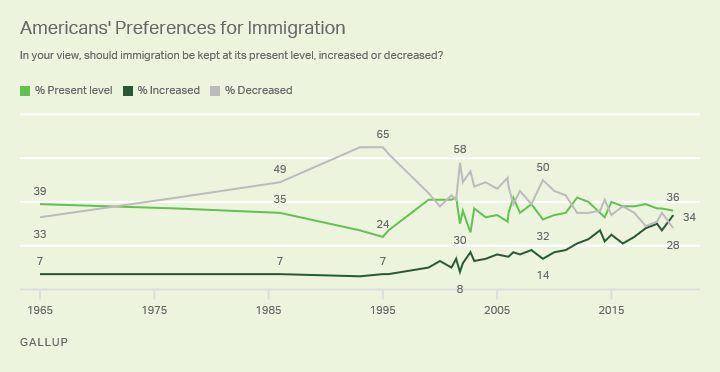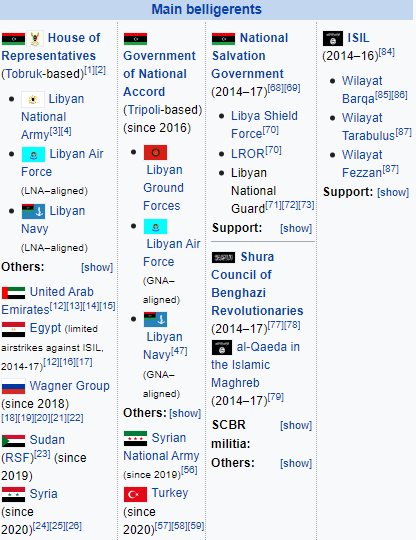
1/I see that there are still a few people shrieking their heads off about how voting Trump out of office will lead to America being overrun by hordes of migrants.
Luckily, I think the last 4 years have clarified our minds on this issue.
kaus.substack.com/p/the-biden-bo…
Luckily, I think the last 4 years have clarified our minds on this issue.
kaus.substack.com/p/the-biden-bo…
2/First of all, you know what HASN'T wrecked our country?
Asylum-seekers from Central America.
You know what HAS wrecked our country?
A plague, which was much worse than it had to be, because we elected a horrible President who focused mainly on cracking down on migrants.
Asylum-seekers from Central America.
You know what HAS wrecked our country?
A plague, which was much worse than it had to be, because we elected a horrible President who focused mainly on cracking down on migrants.
3/Maybe in 2016, with economic recovery underway, it was possible for some people to convince themselves that the biggest threat to our nation was migrant caravans from Honduras.
In 2020, that whole notion just seems laughable.
In 2020, that whole notion just seems laughable.
4/Pro-immigration sentiment has steadily increased while Trump has been in office.
This is no coincidence. It's because people have seen the results of Trumpian xenophobia.
ZERO gains for our nation, just a lot of social division and high-profile cruelty.

This is no coincidence. It's because people have seen the results of Trumpian xenophobia.
ZERO gains for our nation, just a lot of social division and high-profile cruelty.


5/Also, all the attention on migrants has caused the media (including Yours Truly) to relentlessly publicize the fact that illegal immigration has been going in reverse for over a decade! 

6/We're not going to fall for this shtick again.
We've seen what actual threats to our country look like. We don't need to make up imaginary ones.
We've seen what actual threats to our country look like. We don't need to make up imaginary ones.
7/But will Biden actually allow tons of migrants to get asylum in the U.S. -- or to systematically claim asylum and then not show up for court dates, thus immigrating illegally?
I highly doubt it. It would cause a political headache he doesn't want or need.
I highly doubt it. It would cause a political headache he doesn't want or need.
8/My prediction is that Biden will stop separating families and will stop flamboyantly mistreating migrants, but will find quieter, equally effective ways of preventing asylum seekers from becoming a big political issue again.
9/This is part of my general pessimism about immigration. I think that Democrats don't want to risk reinvigorating the Trump movement by letting immigration become a hot-button issue again, and so will quietly let immigration lapse to a low level.
https://twitter.com/Noahpinion/status/1255563601378590720
10/John Higham, in his famous history of American nativism, claims that national CONFIDENCE is the key to open immigration policies.
When Americans are feeling good about America, we let in immigrants.
But we're not feeling confident right now.
amazon.com/Strangers-Land…
When Americans are feeling good about America, we let in immigrants.
But we're not feeling confident right now.
amazon.com/Strangers-Land…
11/It's going to be a while -- at least a decade, I predict -- before Americans feel confident about our nation again. We may give pro-immigration answers to surveys right now, but that reflects hatred of Trump more than a real desire to throw our doors open to the world again.
12/I'd be happy to be proven wrong, of course. This country NEEDS more immigration, and if we don't get it we're going to have economic problems, in addition to losing much of the social vitality that my generation grew up with.
We SHOULD do this:
amazon.com/One-Billion-Am…
We SHOULD do this:
amazon.com/One-Billion-Am…
13/But my prediction is that while the xenophobes are losing the battle for public opinion, they'll win on policy -- for a while.
An energized, vigorous, hateful minority ultimately has veto power over policies like immigration that require broad national buy-in.
An energized, vigorous, hateful minority ultimately has veto power over policies like immigration that require broad national buy-in.
14/Pro-immigration folks need to continue the fight, but we should recognize that the struggle to restore the open, confident America we grew up with will be the struggle of decades, not months.
(end)
(end)
• • •
Missing some Tweet in this thread? You can try to
force a refresh










